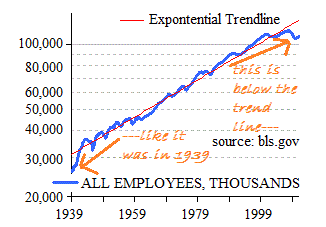- Apr 12, 2011
- 3,814
- 758
- 130
...not sure what exactly you're trying to say hasn't been seen since the depression.
It may be a math/numbers thing so let me know if I'm not explaining it right.
In post #6 I looked at the bls site and "Data Type ALL EMPLOYEES, THOUSANDS; Series Id: CES0500000001". Then I realized that with this timescale we're talking exponential growth so in post #8 I took the same numbers and plotted it with the Y axis in log scale. When it looked like we had 60 years of consistency beginning and ending with anomalies, I added a trend line that showed how employment had grown steadily at three percent yearly but that growth had fallen to a level below that growth that hadn't appeared since 1939.
I'll mark on the graph what I mean:


